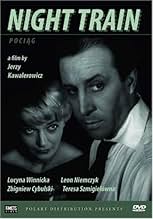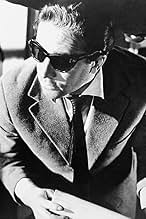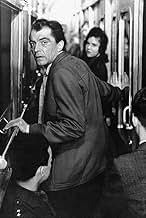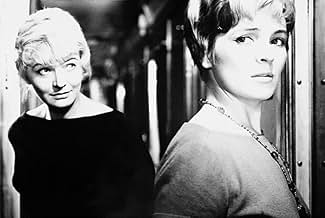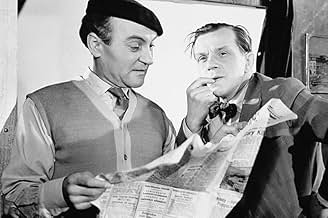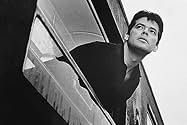IMDb-BEWERTUNG
7,7/10
3918
IHRE BEWERTUNG
Füge eine Handlung in deiner Sprache hinzuJerzy enters a train set for the Baltic coast. He seems to be on the run from something, as does the strange woman with whom he must share a sleeping compartment.Jerzy enters a train set for the Baltic coast. He seems to be on the run from something, as does the strange woman with whom he must share a sleeping compartment.Jerzy enters a train set for the Baltic coast. He seems to be on the run from something, as does the strange woman with whom he must share a sleeping compartment.
- Regie
- Drehbuch
- Hauptbesetzung
- Auszeichnungen
- 2 Gewinne & 1 Nominierung insgesamt
Andrzej Herder
- Sailor
- (Nicht genannt)
Barbara Horawianka
- Jerzy's Wife
- (Nicht genannt)
Empfohlene Bewertungen
A man named Jerzy (Leon Niemczyk) is taking a Night Train along the Baltic coast, he wears dark sunglasses and by his body language we can tell he wants to be alone and to this end, he books a sleeping compartment all to himself, .But on entering his compartment he finds a young blonde woman named Marta (Lucyna Winnicka) occupying it, she refuses to leave even when the train inspector is called, but when the inspector threatens her with the police, Jerzy says forget about it and he lets her stay, suspicious behaviour as the very overcrowded train is awash with talk of the local murderer who is on the run from the police, Marta also seems to have something to hide and is being chased by a young suitor travelling in standard classic, in a train full of different character, could the killer be on board?Jerzy calls a truce with Marta and soon their conversation begins to open up, a bond gradually grows between the two but is interrupted when the police hunting for the killer, board the train in a remote area and immediately arrest Jerzy, can he prove his innocence on the remaining journey? Jerzy Kawalerowicz perhaps best known as the director of the superb tale of possession, Matka Joanna od aniolów (1961) here produces a Hitchcockian type thriller set on a train with equally successful results. Set to a jazzy score Andrzej Trzaskowski, which adds immensely to the atmosphere while also perfectly suiting the motion of the train, we are gradually introduced to many of the different characters on board, a large group on a pilgrimage, the desperately flirtatious wife of a Polish solicitor, intent on getting some attention from whoever will listen, the young priest travelling with his elderly Monsiegnor, we even get to know the train staff intimately. Jan Laskowski's cinematography is beautiful and captures the claustrophobia of the overcrowded train, but yet still retains a sense of movement in a confined space. The killer being chased at dawn across cold open fields by all on board is a highlight, it finishes with the killer's capture in a rundown graveyard. The films ending is quite apt and somewhat downbeat as all the travellers return to their own lives at their destination, after the excitement of the previous night.
You know from the first minute that this is a different kind of train thriller. The first shots are in the station, lots of people bustling about, but instead of "busy" music on the soundtrack, the music here is slow, and it is cool jazz. This sets up the detached tone from the beginning. Some of the characters are nervous, even hysterical, but the director keeps everything at arm's length.
The story is very simple: A man on the train is fleeing after killing his wife. It is not known whether he is alone or with a woman. The movie concentrates on two couples, a single woman, and a single man. The three women move between the men--are they ordinary women looking for companionship, or is one of them trying to help, or escape from, the killer?
The scene in which the murderer is caught will recall the same scene in M and, of course, since the movie is Polish, the hunting down of fleeing, terrified people which so recently happened on Polish soil. The photography, excellent throughout, is especially beautiful and powerful in this scene. The director makes us aware of the symbolism, but not in an obtrusive way. The man who picks up the Cross and what he does with it quietly makes the point that the murderer and his pursuers are not different in kind, only in degree.
The story is very simple: A man on the train is fleeing after killing his wife. It is not known whether he is alone or with a woman. The movie concentrates on two couples, a single woman, and a single man. The three women move between the men--are they ordinary women looking for companionship, or is one of them trying to help, or escape from, the killer?
The scene in which the murderer is caught will recall the same scene in M and, of course, since the movie is Polish, the hunting down of fleeing, terrified people which so recently happened on Polish soil. The photography, excellent throughout, is especially beautiful and powerful in this scene. The director makes us aware of the symbolism, but not in an obtrusive way. The man who picks up the Cross and what he does with it quietly makes the point that the murderer and his pursuers are not different in kind, only in degree.
Sadly, I can't agree with most people who find this film to be Hitchcockesque in its representation of a thriller.
To say this would be to say that your Jaguar is just like a Mercedes. They might both be fine cars, but they are in no way alike.
The really quite simplistic plot travels at a slow and in many ways, inexplicable pace. There is little tension built up, and, for the most part, little mystery to be found.
However, don't take any of this to be a retrograde description.
The various small character subplots and interactions are wonderful. The whole journey has a quite haunting feel to it, which I find I am at loss to explain, because if I analyse the film, there is no real reason to this feeling. And yet, there it is.
The beautiful and mysterious Lucyna Winnicka is utterly mesmerising.
In so many ways this film shouldn't work with anything like the power it achieves, but somehow it does. If it captures you in the way it has me, then it will stay with you long after the event, from the strange individual passengers right down to the oh so ethereal soundtrack.
I am without explanation, but I truly hope it gives you the feeling of something wonderful it gave me.
To say this would be to say that your Jaguar is just like a Mercedes. They might both be fine cars, but they are in no way alike.
The really quite simplistic plot travels at a slow and in many ways, inexplicable pace. There is little tension built up, and, for the most part, little mystery to be found.
However, don't take any of this to be a retrograde description.
The various small character subplots and interactions are wonderful. The whole journey has a quite haunting feel to it, which I find I am at loss to explain, because if I analyse the film, there is no real reason to this feeling. And yet, there it is.
The beautiful and mysterious Lucyna Winnicka is utterly mesmerising.
In so many ways this film shouldn't work with anything like the power it achieves, but somehow it does. If it captures you in the way it has me, then it will stay with you long after the event, from the strange individual passengers right down to the oh so ethereal soundtrack.
I am without explanation, but I truly hope it gives you the feeling of something wonderful it gave me.
Although it has superficial similarities with Hitchcock films (it's in black and white; it takes place on a train; it's a murder mystery; there are plenty of red herrings and misleading clues), I loved this moody Polish film because it is visually stunning and refreshingly free of Hollywood clichés. I saw a lot of Expressionist influence in the artfully planned staging and unusual camera angles, both inside the cramped railway corridors and outside the train in various stops along the route. The film is fairly demanding on the viewer: there are a lot of secondary characters with complicated stories of their own, and I found myself repeatedly pausing the DVD to catch details that I had missed. The final scenes were intricately choreographed and highly stylized, reminiscent of black-and-white-era Fellini. Not for everyone, but I found it delightful and plan to watch it again.
10gombro
The film beautifully depicts the reality of trains, possibly not only those running in Poland but also all over the world. The claustrophobic atmosphere of the train brings people together and lets the viewers plunge into the story and its rhythm. Beautiful black and white pictures and melancholic jazz theme bring to mind other films form the era. What makes the film even more attractive is the final turning point and sudden change in the behavior of the passengers. The only regretful fact is that such intimate,subtle films are not made anymore. Great pity.If it was made in English by lets say Orson Welles it would have been a cult movie for sure all over the world just as it is in Poland.
Wusstest du schon
- WissenswertesStaszek, the young man following Marta, is seen several times getting on the train after it has started moving. The inspector warns him a couple of times that it is dangerous. Zbigniew Cybulski who plays Staszek died a few years later, aged 39, after falling under a moving train he was attempting to board at Wroclaw Glowny railway station in Poland.
- VerbindungenFeatured in Fejezetek a film történetéböl: A lengyel film (1990)
Top-Auswahl
Melde dich zum Bewerten an und greife auf die Watchlist für personalisierte Empfehlungen zu.
- How long is Night Train?Powered by Alexa
Details
- Laufzeit
- 1 Std. 39 Min.(99 min)
- Farbe
- Sound-Mix
- Seitenverhältnis
- 1.37 : 1
Zu dieser Seite beitragen
Bearbeitung vorschlagen oder fehlenden Inhalt hinzufügen

